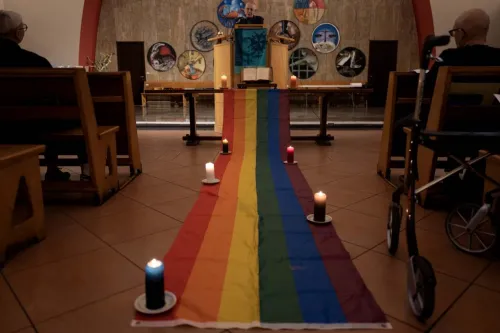In August of 1968, representatives from every Catholic Bishop's Conference in Central and South America and the Caribbean met in Medellín, Colombia with a simple mission. Apply the vision of the Second Vatican Council to the region.
What emerged from the conference was a series of documents that looked at every aspect of Latin American life and gave pastoral advice. "The Church in the Present-Day Transformation of Latin America in the Light of the Council" makes it clear that the Catholic Church decided that it was making a decision to side with the poor in this part of the world and think through its theology to live it out in practical and faithful means.
The methodology used by the conference was adjacent to Liberation Theology which was just beginning to appear in the discussions of the church. A social analysis was followed by scriptural and theological reflections. The methodology came to be called the "circle of praxis", another way of describing the process of "observe, judge, act". See note below.
"The traditionalists or conservatives show little or no social conscience, have a middle-class orientation and consequently do not question social structures...in general they are concerned with preserving the privilege which they identity with the established order." Liberation theology has contributed positively to agrarian reform, poverty reduction, and human rights and continues to push back and challenge the our middle and upper class orientation.
The influence of Liberation Theology and the Medellín Conference has forever impacted the church and theology, with the call of God's preferential option for the Poor. Read more about Liberation Theology in the documents below or the book by Gustavo Gutierrez "Liberation Theology"
Note on the "Circle of Praxis"
To this day, the "Circle of Praxis" is still in use in many justice and peace ministries. Step on in the Circle of Praxis Pedagogy is Insertion/Immersion. In this step, the starting point is not an academic idea, but rather direct encounters with people living at the margins or trying to overcome unjust systems. This step can be accomplished in many different ways, (immersion trips, community service and engagements, film, guest speakers etc.
The second step is Descriptive Analysis. This step seeks to identify specific causal factors that are directly resulting in hunger, poverty, violence, war, or social injustice. This results in the rigorous study of poverty and the underlying systems resulting in harmful practices. It points to decision makers as well as who benefits from decisions that are made. Who is paying the cost?
The Third Step is Normative Analysis. After steps are taken to experience the world, and to determine the causal factors using the best in social science (descriptive analysis), then normative analysis happens. It is important to recognize that human suffering, poverty, inequality, racism, hunger, war and violence requires a radical reassessment of the faith system that supports the unjust system. The underlying values and vision of a system are examined. Here voice, decision making, and collective agency are all examined for how to change an unjust system. Problematic biases are examined, as well as our assumptions.
The Fourth Step is Action Planning. This is where people can take responsibility as agents of change. Here the goal is to pause and examine/re-examine how actions actually result in the real world. Based on all available data, an action plan is created that is specific. There is always a commitment to "do no harm", it is important to understand how unintended consequences often can hurt the underlying goal of equality and social change. When actions steps are identified and planned, execution of those steps and a later reanalysis of the results can lead to change, and an accountability of that change.
Books and links for further reading:
Ellacuria, Ignacio and Jon Sobrino. 1993. Mysterium Liberationis: Fundamental Concepts
of Liberation Theology. Maryknoll, NY: Orbis Book
Freire, Paulo. 1970. /1990. Pedagogy of the Oppressed. New York, NY: Continuum.
Freire, Paulo. 1973. Education for Critical Consciousness. New York, NY: Continuum.
Galtung, Johann. 1996. Peace by Peaceful Means: Peace and Conflict, Development and
Civilization. Oslo: International Peace Research Institute.
In the Light of the Council Document
Liberation Theology






